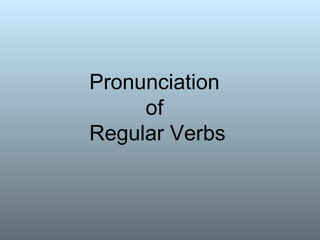Report
Share

Recommended
More Related Content
What's hot (20)
Viewers also liked
Viewers also liked (8)
More from anarosaleda
More from anarosaleda (20)
Pronunciation Regular Verbs
- 1. Pronunciation of Regular Verbs
- 2. 1. When the regular verb ends in a voiceless consonant sound [ p, k, ʃ , tʃ, s, x, f, θ ] (stop, ask, wash, watch, kiss, fix, laugh, worth) the -ed ending is pronounced / t / Look-ed /lʊk//t/
- 3. 2. When the regular verb ends in a vowel sound or voiced consonant sound [ b , g, l, m, n, ŋ, r, v, w, z ] (describe, call, welcome, explain, belong, explore, believe, interview, use) the -ed ending is pronounced / d / travel-led / 'trævəl//d/
- 4. 3. When the regular verb ends in the consonant sounds /t/ and /d/ the -ed ending is pronounced / id / Paint-ed /peɪnt//id/